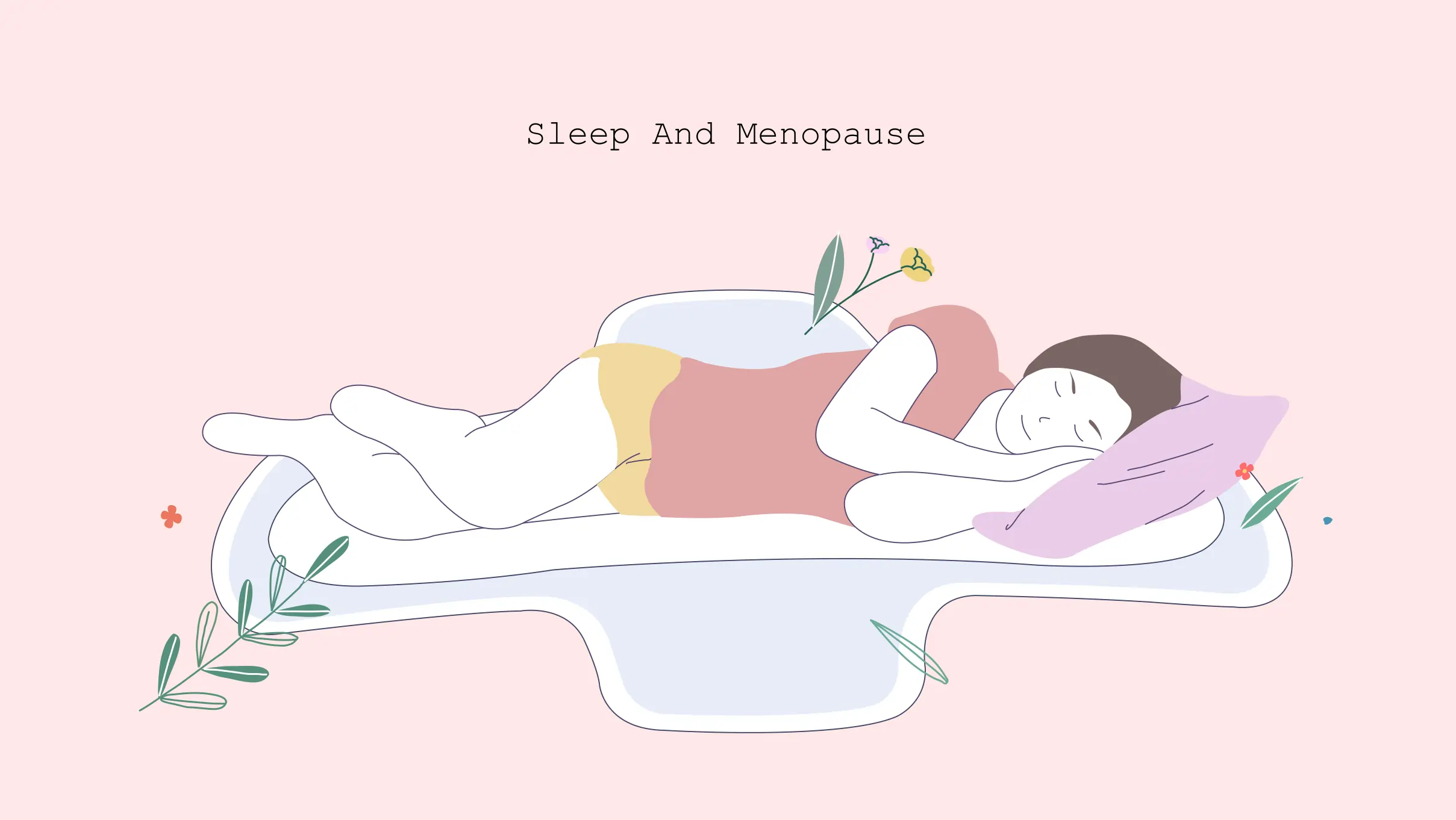How Does Menopause Affect My Sleep?
Written by


Menopause is a major life event for most women, and it can cause some changes in the way your body works. These changes may cause you to feel more tired or even depressed when you wake up.
You may also experience irritability and moodiness, as well as an increase in anxiety or depression during this time of change. Add to that, the body’s hormone levels change during menopause, leading to sleep problems— from hot flushes to sleepless nights— for most women.
Read on as we discuss these sleep issues and how you can get some relief. So, without any further ado, scroll down and find out:
What Is Menopause?
Menopause is when women stops having menstrual periods and are no longer able to conceive. It is diagnosed when a woman’s menstrual periods stop for about 12 months. It can be hard to know what to expect during this time, especially since there are varying symptoms.
Some women experience hot flashes and night sweats, while others may not have any symptoms at all.
The average age at which a woman reaches menopause is between 40 and 58 years old.
What Sleep Issues Are Associated With Menopause?
Sleep is important for maintaining a healthy body, mind, and spirit. It helps you process stress and maintain your moods. Sleep also enables you to recover from physical and mental exhaustion. Sleep issues are associated with menopause in women of all ages.
Here Are Some Prevalent Menopause and Sleep Issues That Many Women Experience:
Hot Flashes
Hot flashes are amongst the most common menopause sleep problems. Hot flashes are caused by sudden shifts in body temperature that cause your blood vessels to expand and contract quickly. The temperature change can make you feel flushed, sometimes with sweat on your face or hands.
In addition to the physical sensations associated with hot flashes, many women find other symptoms like anxiety or irritability during this hormonal change. The severity of hot flashes varies from person to person and can range from mild to severe.
There are some simple ways to manage hot flushes and reduce their impact on your day-to-day life:
- Drink plenty of water
- Eat a balanced diet
- Exercise regularly
- Don’t Smoke
Insomnia
Insomnia is a common complaint among women with menopause. The symptoms of insomnia can include difficulty falling asleep, staying asleep, and early morning awakening.
Insomnia can cause other symptoms, such as fatigue, moodiness, and irritability. Insomnia makes it difficult to concentrate at work. It can also lead to eating disorders such as anorexia nervosa and bulimia nervosa.
To deal with menopause, anxiety, mood swings and lack of sleep, try natural remedies like lavender oil capsules or chamomile tea.
Sleep-Disordered Breathing
Sleep-disordered breathing (SDB) is when you have trouble sleeping or snoring. Menopause can be a time of increased risk for SDB because of hormonal changes.
Not only does it cause sleep disturbances and daytime fatigue, but it also increases the risk of heart attack, stroke, and other health problems.
Treatment for sleep apnea includes:
- Alleviating sleep apnea symptoms by using a CPAP machine
- Treating underlying conditions such as obesity which contribute to lack of oxygen
Other Mood and Sleep Disorders
Depression, anxiety, and sleep disorders can all affect women during menopause. The most common type of sleep disorder is insomnia, which is characterised by difficulty falling asleep or staying asleep. Insomnia may be caused by anxiety and stress. The same brain chemicals that cause depression can also cause insomnia — making it difficult to tell the difference between a mood disorder and a sleep disorder.
If you’re experiencing these problems, talk to your doctor about treatment options that may help. Antidepressants are the first-line treatment for depression. They work by increasing levels of the neurotransmitter serotonin in your brain.
How Can I Treat Sleep Problems Related to Menopause?
Hormone Replacement Therapy:
Hormone replacement therapy (HRT) is a treatment option for menopausal women with vaginal dryness, hot flashes, and night sweats. HRT helps relieve sleep and menopause symptoms by replacing the hormones that are missing during menopause.
HRT consists of two types of medications: estrogen and progesterone.
Estrogen is the female hormone produced by the ovaries in a woman’s body; it plays an important role in regulating many physiological functions, including bone growth and density, mood, and cognition.
Progesterone is another natural hormone produced by the ovaries during pregnancy in response to high estrogen levels; it plays an important role in maintaining healthy blood pressure levels and healthy immune function.
There are different types of HRT available today – each with its benefits and risks – so it’s important to speak with your doctor about which one may be right for you.
Medications:
Many medications are available to treat sleep and menopause disorders, including nonprescription or over-the-counter (OTC). These medications work by helping to reduce stress and anxiety or relax muscles so that they don’t tense up during the night. They can also help people relax before bed so they can quickly fall asleep once they lie down.
Some OTC medications include fluoxetine (Prozac), paroxetine (Brisdelle, Paxil), venlafaxine (Effexor), and several others.
Tips for Sleeping Better With Menopause
Here are some tips on to get relief from sleep and menopause troubles:
- Avoid eating large meals during the night.
- Exercise regularly.
- Maintain a comfortable temperature in your bedroom.
- Keep Your Sleep Schedule.
- Stay away from caffeine.
- Avoid afternoon naps.
Conclusion
Menopause can be difficult for women to deal with, particularly because changes in sleep patterns often accompany the process.
While there’s no magic bullet for sleep and menopause disorders, plenty of treatments can help on various levels. Probably more than one solution can work for your particular needs.
FAQs
How Can I Get Better Sleep During Menopause?
Most of us crave a good night’s sleep every day, and it can be especially hard to do during menopause.
The answer may seem complicated, but there are many things you can do to help give yourself better sleep, like focusing on your diet and exercise, managing your stress and anxiety, and even practising positive thinking. All these tips should help aid the sleeping better at night during menopause.
Why Does the Menopause Affect Sleep?
Menopause and sleep have a rooted relationship. During perimenopause and menopause, the production of estrogen and progesterone is reduced due to declining levels of circulating hormones.
During this time, sleep quality may be affected by changes in neurotransmitter activity, including decreases in serotonin (a neurotransmitter that regulates mood), melatonin (a hormone that promotes sleep onset), and GABA (a neurotransmitter that regulates sleep patterns).
Additionally, other factors can impact sleep quality during this period, including hot flashes and night sweats, as well as hormonal imbalances such as low progesterone.
Does Menopause Insomnia Go Away?
Although insomnia is one of the prevalent perimenopause sleep problems, it is usually temporary. When you start noticing insomnia symptoms or have been experiencing them for a while, you must talk with your doctor about possible treatment options.
Treatment can include non-pharmacological treatments like relaxation techniques or cognitive behavioral therapy (CBT). Some medications may also be prescribed for treatment-related issues like hot flashes or night sweats.
How Much Sleep Does a Menopausal Woman Need?
They need about seven & eight hours of quality, uninterrupted sleep each night for their healthy well-being. This way, you can sleep and have menopause problems that most women experience.
people like this article
Written by








